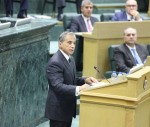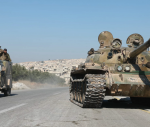You are here
Palestine is still alive
May 14,2014 - Last updated at May 14,2014
Today marks the 66th observance of the Nakbeh (day of catastrophe), when the state of Israel was created on Palestinian land in 1948.
It is a bleak day in the Arab calendar, one that ushered in decades of suffering for the Palestinian people who, ever since, have witnessed their land taken from them by Jewish immigrants from various parts of the world, particularly Europe, through wars, acts of deceit and forgery.
For the Palestinian people all over the world, estimated at 12 million, Nakbeh is a day to remember their displacement that climaxed in the creation of Israel, a process in which the minority Jewish population, who used to number less than one per cent before the start of the 20th century, was given the majority of Palestine by unfair international resolutions backed by Western powers, particularly the US and Europe, whose sense of guilt because of the holocaust was a major driving force to undertake this move.
Many believe the spark for Nakbeh was ignited way before the creation of Israel, starting with the 1897 First Zionist Congress in Basel, Switzerland, which called for the establishment of a Jewish state, and with the 1917 Balfour Declaration in which Britain, through its foreign secretary Arthur James Balfour, promised a homeland for Jews in Palestine.
The notorious declaration was made to Walter Rothschild, a leader of the Jewish community in Britain, stating that: “His Majesty’s government view with favour the establishment in Palestine of a national home for the Jewish people, and will use their best endeavours to facilitate the achievement of this object…”.
During its later mandate of Palestine, Britain worked to achieve that objective by facilitating the immigration of Jews to Palestine, which peaked in the wake of the holocaust, that resulted in the death of millions of innocent people throughout Europe, Jews and non-Jews alike.
The Palestinians were the unsuspecting victims of the Balfour Declaration, the British mandate, the holocaust and the post-World War II political dynamics that swept the global arena.
These indigenous people were “guilty” only of resisting attempts to have their land taken over by foreigners with the complicity of world powers.
Six-and-a-half decades later, they are still waiting for justice to be achieved, for their rights to be restored and for their suffering to end.
Nevertheless, their suffering and struggle continue despite their attempts to regain their rights and establish their state through peace negotiations, and despite many United Nations resolutions that were passed to assert their rights or were vetoed by a corrupt global political system.
Their peaceful efforts are not given a chance by the world.
Despite it all, Palestinians continue to exist all over the world, 12 million of them, at home and in the diaspora. They know that the birth of their state is a matter of time.
They are steadfast in their belief and struggle, and while waiting, they preserve their national identity, serve the communities where they live, work hard to improve their lot in life and keep the memory of their Palestine alive.
They continue to do so despite Zionist attempts to erase the existence of these 12 million people and that deny them their rights to their homeland, the right to have a place under the sun like every other nation in the world.












